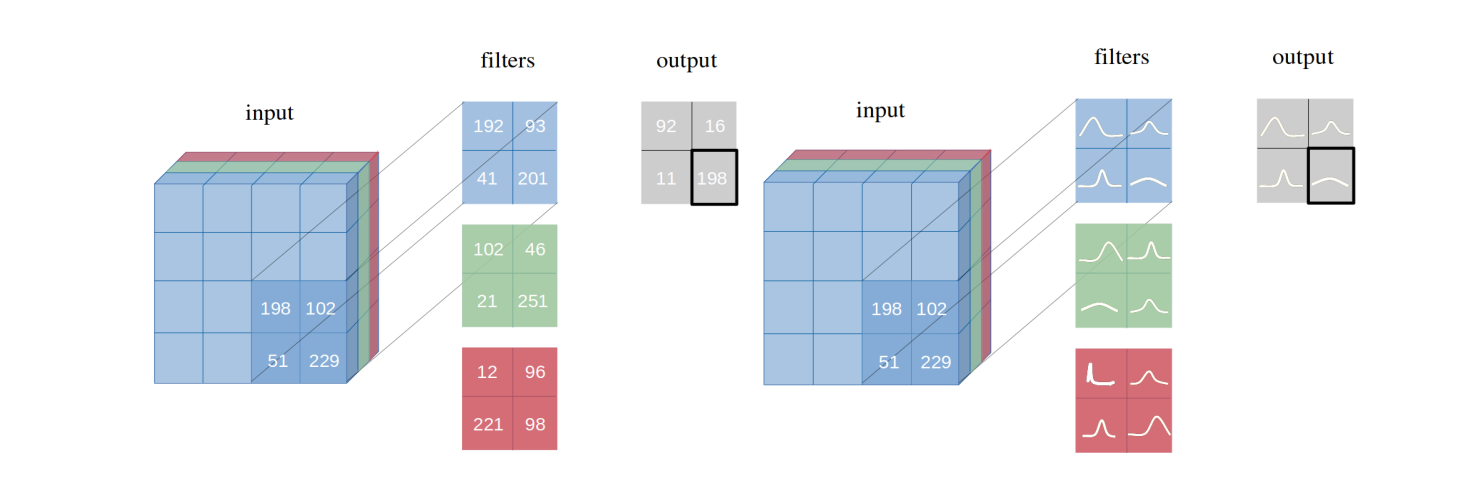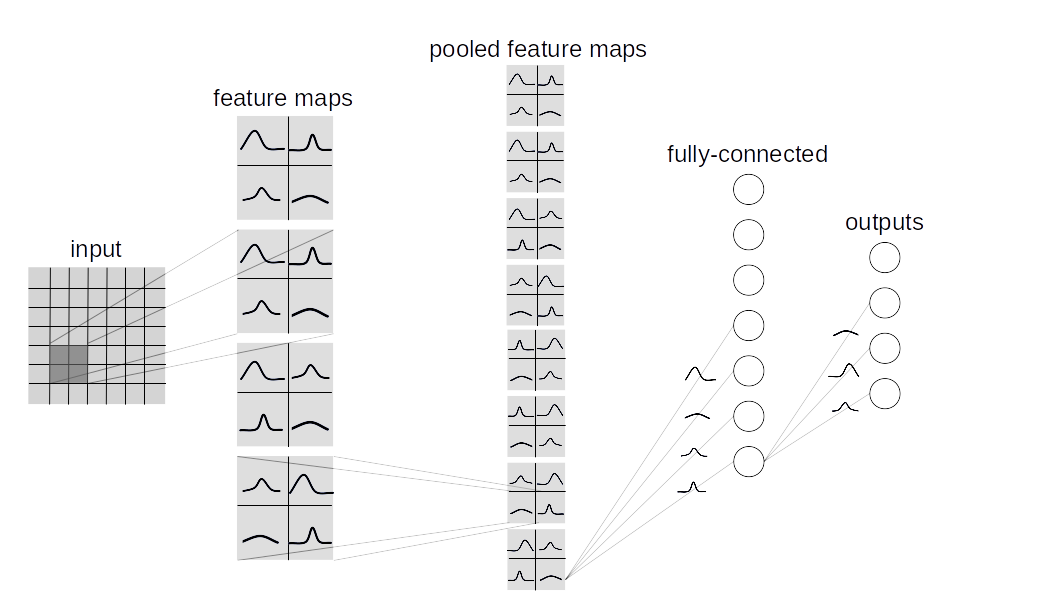kumar-shridhar / Pytorch Bayesiancnn
Programming Languages
Labels
Projects that are alternatives of or similar to Pytorch Bayesiancnn
We introduce Bayesian convolutional neural networks with variational inference, a variant of convolutional neural networks (CNNs), in which the intractable posterior probability distributions over weights are inferred by Bayes by Backprop. We demonstrate how our proposed variational inference method achieves performances equivalent to frequentist inference in identical architectures on several datasets (MNIST, CIFAR10, CIFAR100) as described in the paper.
Filter weight distributions in a Bayesian Vs Frequentist approach
Fully Bayesian perspective of an entire CNN
Layer types
This repository contains two types of bayesian lauer implementation:
-
BBB (Bayes by Backprop):
Based on this paper. This layer samples all the weights individually and then combines them with the inputs to compute a sample from the activations. -
BBB_LRT (Bayes by Backprop w/ Local Reparametrization Trick):
This layer combines Bayes by Backprop with local reparametrization trick from this paper. This trick makes it possible to directly sample from the distribution over activations.
Make your custom Bayesian Network?
To make a custom Bayesian Network, inherit layers.misc.ModuleWrapper instead of torch.nn.Module and use BBBLinear and BBBConv2d from any of the given layers (BBB or BBB_LRT) instead of torch.nn.Linear and torch.nn.Conv2d. Moreover, no need to define forward method. It'll automatically be taken care of by ModuleWrapper.
For example:
class Net(nn.Module):
def __init__(self):
super().__init__()
self.conv = nn.Conv2d(3, 16, 5, strides=2)
self.bn = nn.BatchNorm2d(16)
self.relu = nn.ReLU()
self.fc = nn.Linear(800, 10)
def forward(self, x):
x = self.conv(x)
x = self.bn(x)
x = self.relu(x)
x = x.view(-1, 800)
x = self.fc(x)
return x
Above Network can be converted to Bayesian as follows:
class Net(ModuleWrapper):
def __init__(self):
super().__init__()
self.conv = BBBConv2d(3, 16, 5, strides=2)
self.bn = nn.BatchNorm2d(16)
self.relu = nn.ReLU()
self.flatten = FlattenLayer(800)
self.fc = BBBLinear(800, 10)
Notes:
- Add
FlattenLayerbefore firstBBBLinearblock. -
forwardmethod of the model will return a tuple as(logits, kl). -
priorscan be passed as an argument to the layers. Default value is:
priors={
'prior_mu': 0,
'prior_sigma': 0.1,
'posterior_mu_initial': (0, 0.1), # (mean, std) normal_
'posterior_rho_initial': (-3, 0.1), # (mean, std) normal_
}
How to perform standard experiments?
Currently, following datasets and models are supported.
- Datasets: MNIST, CIFAR10, CIFAR100
- Models: AlexNet, LeNet, 3Conv3FC
Bayesian
python main_bayesian.py
- set hyperparameters in
config_bayesian.py
Frequentist
python main_frequentist.py
- set hyperparameters in
config_frequentist.py
Directory Structure:
layers/: Contains ModuleWrapper, FlattenLayer, BBBLinear and BBBConv2d.
models/BayesianModels/: Contains standard Bayesian models (BBBLeNet, BBBAlexNet, BBB3Conv3FC).
models/NonBayesianModels/: Contains standard Non-Bayesian models (LeNet, AlexNet).
checkpoints/: Checkpoint directory: Models will be saved here.
tests/: Basic unittest cases for layers and models.
main_bayesian.py: Train and Evaluate Bayesian models.
config_bayesian.py: Hyperparameters for main_bayesian file.
main_frequentist.py: Train and Evaluate non-Bayesian (Frequentist) models.
config_frequentist.py: Hyperparameters for main_frequentist file.
Uncertainty Estimation:
There are two types of uncertainties: Aleatoric and Epistemic.
Aleatoric uncertainty is a measure for the variation of data and Epistemic uncertainty is caused by the model.
Here, two methods are provided in uncertainty_estimation.py, those are 'softmax' & 'normalized' and are respectively based on equation 4 from this paper and equation 15 from this paper.
Also, uncertainty_estimation.py can be used to compare uncertainties by a Bayesian Neural Network on MNIST and notMNIST dataset. You can provide arguments like:
-
net_type:lenet,alexnetor3conv3fc. Default islenet. -
weights_path: Weights for the givennet_type. Default is'checkpoints/MNIST/bayesian/model_lenet.pt'. -
not_mnist_dir: Directory ofnotMNISTdataset. Default is'data\'. -
num_batches: Number of batches for which uncertainties need to be calculated.
Notes:
- You need to download the notMNIST dataset from here.
- Parameters
layer_typeandactivation_typeused inuncertainty_etimation.pyneeds to be set fromconfig_bayesian.pyin order to match with provided weights.
If you are using this work, please cite:
@article{shridhar2019comprehensive,
title={A comprehensive guide to bayesian convolutional neural network with variational inference},
author={Shridhar, Kumar and Laumann, Felix and Liwicki, Marcus},
journal={arXiv preprint arXiv:1901.02731},
year={2019}
}
@article{shridhar2018uncertainty,
title={Uncertainty estimations by softplus normalization in bayesian convolutional neural networks with variational inference},
author={Shridhar, Kumar and Laumann, Felix and Liwicki, Marcus},
journal={arXiv preprint arXiv:1806.05978},
year={2018}
}
}






